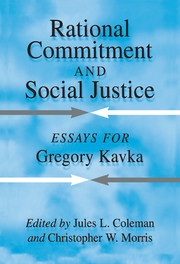Book contents
- Frontmatter
- Contents
- Acknowledgments
- List of Contributors
- Introduction: The Moral and Political Philosophy of Gregory Kavka
- Some Personal Memories
- The Shadow of the Future
- A New Paradox of Deterrence
- Rethinking the Toxin Puzzle
- Toxin, Temptation, and the Stability of Intention
- The Toxin Puzzle
- Religion and Morality in Hobbes
- Contemporary Uses of Hobbes's Political Philosophy
- The Knavish Humean
- Some Considerations in Favor of Contractualism
- Justice, Reasons, and Moral Standing
- Wrongful Life: Paradoxes in the Morality of Causing People to Exist
- Gregory S. Kavka's Writings
Gregory S. Kavka's Writings
Published online by Cambridge University Press: 28 October 2009
- Frontmatter
- Contents
- Acknowledgments
- List of Contributors
- Introduction: The Moral and Political Philosophy of Gregory Kavka
- Some Personal Memories
- The Shadow of the Future
- A New Paradox of Deterrence
- Rethinking the Toxin Puzzle
- Toxin, Temptation, and the Stability of Intention
- The Toxin Puzzle
- Religion and Morality in Hobbes
- Contemporary Uses of Hobbes's Political Philosophy
- The Knavish Humean
- Some Considerations in Favor of Contractualism
- Justice, Reasons, and Moral Standing
- Wrongful Life: Paradoxes in the Morality of Causing People to Exist
- Gregory S. Kavka's Writings
Summary
1974
“Moral Ideals.” Ph.D. diss., University of Michigan, Ann Arbor, 1973. Abstract in Dissertation Abstracts International (August 1974), 35(2A):1161-A.
“Wittgensteinian Political Theory.” Review of Hanna Fenichel Pitkin's Wittgenstein and Justice: On the Significance of Ludwig Wittgenstein for Social and Political Thought. Stanford Law Review 26 (1974), 1455–80.
“Wrongdoing and Guilt.” Journal of Philosophy 71 (1974), 663–4.
1975
“Extensional Equivalence and Utilitarian Generalization.” Theoria 41 (1975), 125–47.
“Rawls on Average and Total Utility.” Philosophical Studies 27 (1975), 237–53.
1976
“Equality in Education.” In Indeterminacy in Education: Social Science, Educational Policy and the Search for Standards, ed. John E. McDermott. Berkeley: Mc– Cuthchan, 1976. Pp. 211–52.
“Eschatological Falsificationism.” Religious Studies 12 (1976), 201–5.
1978
“The Futurity Problem.” In Obligations to Future Generations, ed. Richard Sikora and Brian Barry. Philosophical Monographs, no. 2. Philadelphia: Temple University Press, 1978. Pp. 186–203.
“Some Paradoxes of Deterrence.” Journal of Philosophy 75 (1978), 285–302. See Moral Paradoxes of Nuclear Deterrence (1987), ch. 1, pp. 15–32.
1979
“The Numbers Should Count.” Philosophical Studies 36 (1979), 285–94.
1980
“Deterrence, Utility, and Rational Choice.” Theory and Decision 12 (1980), 41–60. See Moral Paradoxes of Nuclear Deterrence (1987), ch. 3, pp. 57–77.
“What Is Newcomb's Problem About?” American Philosophical Quarterly 17 (1980), 271–80.
1981
Review of Renford Bambrough's Moral Scepticism and Moral Knowledge. Philosophical Review 90 (1981), 630–3.
1982
“Deterrence and Utility Again: A Response to Bernard.” Theory and Decision 14 (1982), 99–102. A response to George Bernard's “Deterrence, Utility, and Rational Choice: A Comment,” in the same issue, pp. 89–97.
- Type
- Chapter
- Information
- Rational Commitment and Social JusticeEssays for Gregory Kavka, pp. 249 - 253Publisher: Cambridge University PressPrint publication year: 1998

